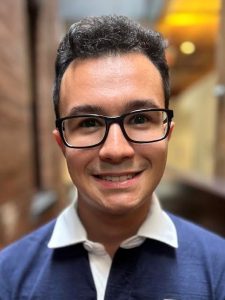
Kiril Mojsov is back in Toronto with tips to share with students new to the city. Raised here, the new master’s in economics student completed the Politics, Philosophy and Economics (PPE) undergraduate program at Queen’s University in Kingston.
His first tip for new undergraduates? Stay flexible and be prepared for learning to change you. Afterall, an economics MA program was not always part of his plan.
“What’s unique about being here now, is that I wasn’t an applied economics or economics undergraduate student,” Kiril explained. “Going into first year, I was dead set on more of a law and policy angle. Back then, I was taking only one economics and one math course. The rest were politics and philosophy-based courses, but as I was going along my path, I just fell more in love with economics and the idea of working in policy from the angle of an economist.”
As he took more economics classes, he became “less rhetoric and more scientific” in his approach.
“I did PPE thinking I would go to law school,” he said. “And then, I suddenly realized there are analyst positions and economist positions in Ottawa as well as Toronto that cater more towards the skillset that I really clicked with. I do think more mathematically and have a more quantitatively focused brain. And so, I transitioned my academic career.”
That transition has inspired new goals. Kiril now has his sights on an eventual PhD program and a more specific career.
“I know a lot of students will say this, but The Bank of Canada is now the dream job, the goal, the target,” Kiril said.
Talk of dream jobs leads directly into Kiril’s second tip for students new to Toronto: Network. Taking the time to develop and expand social skills is especially necessary in Canada’s biggest city.
“I was born at North York General Hospital, but I have grandparents living in Macedonia and I spent a lot of my childhood summers in Europe. I feel it’s great for anyone’s development to have a dual cultural experience. Canada is great, but I find it is both a colder climate and a colder culture. It is much more work focused than in Macedonia, which is economically worse off. Growing up, I did notice the economic disparity between the two countries. You learn from experiences in one country that is considered one of the most developed, progressive countries in the world, and from being in another country that’s one of the most stagnant, if not, one of the worst performing economies in Europe. Macedonia is a side of Europe, that people don’t really see. It’s culturally European, but it doesn’t have the wealth, the industry, or the prosperity nations like Switzerland or Germany have. At the same time, people are warmer in Macedonia. It’s easier to make friends. In Toronto, you have to make an effort.”
Kiril started reaching out to other members of the master’s program over LinkedIn this summer. He also plans to join at least one or two clubs.
“There’s a club, I believe it’s called the University of Toronto Consulting Association, that I think will be a good complement to academics because students will meet people that are interested in business and management consulting who might not be from an economics background,” Kiril said. “But you do know that they will have shared interests and being with like-minded people makes socializing easier.”
Socializing brings Kiril’s third tip about student life in Toronto: act like an economist and watch your money. Toronto is an expensive city.
“Eat at home as much as you can,” Kiril cautions. “The cost of food in grocery stores in comparable to Kingston, but eating in restaurants is a lot more expensive, even take out. But it’s not just food. If you have a car and really like driving, I have bad news for you. In Toronto it is not the most practical way to go around. It’s expensive to drive and to park. Plus, there’s the frustration over the traffic you get caught in. Get used to public transport, it’s cheaper and easier. There’s a $130 a month Presto pass!”
Return to the Department of Economics website.
Scroll more news.
